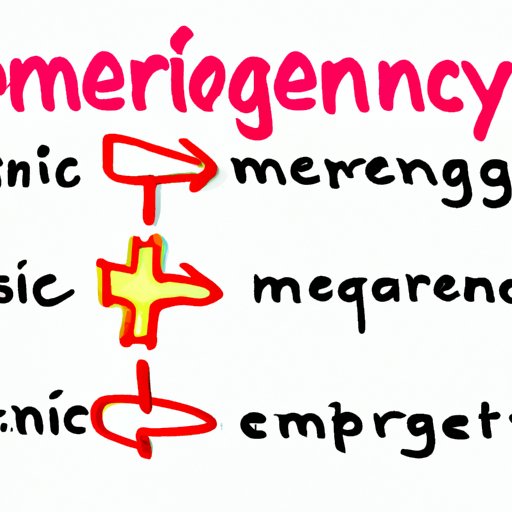
Introduction
Emergency medicine is the branch of medicine that focuses on providing immediate medical care to patients with acute illness or injury. These professionals are trained to handle a wide range of situations, from car accidents to heart attacks to pandemics. Emergency medicine is an essential component of healthcare as it helps to save countless lives every day. In this article, we’ll explore the top life-saving procedures and the ABCs of emergency medicine, the evolving role of emergency medicine in our society, the impact of COVID-19 on emergency medicine, and finally, meet the unsung heroes of healthcare: emergency medicine professionals.
Top 5 Life-Saving Procedures in Emergency Medicine
Emergency medicine professionals perform a range of life-saving procedures in critical situations. The top five life-saving procedures include:
- Cardiopulmonary resuscitation (CPR): CPR is a procedure that is performed when someone’s heart stops beating or when they stop breathing. CPR involves chest compressions and rescue breathing to keep the person alive until medical help arrives.
- Trauma resuscitation: Trauma resuscitation is a procedure that is performed on people who have been severely injured due to an accident or an act of violence. It involves stabilizing the patient and controlling any bleeding.
- Intubation: Intubation is the process of placing a tube into a patient’s airway. This is done to help them breathe or to provide anesthesia during surgery.
- Central line placement: A central line is a long, thin tube that is placed into a patient’s blood vessel. This is done to give medications, fluids, or nutrients to the patient.
- Defibrillation: Defibrillation is a procedure that is used to reset the heart when it begins to beat irregularly. This is done by delivering an electric shock to the heart.
The importance of these life-saving procedures cannot be overstated. Emergency medicine professionals have the knowledge and skills to save someone’s life in a matter of seconds.
Understanding the ABCs of Emergency Medicine
The ABCs of emergency medicine are Airway, Breathing, and Circulation. These fundamental principles are the foundation of emergency medicine and are followed by emergency medicine professionals worldwide. The ABCs of emergency medicine are crucial in all emergency situations as they help to identify and address any immediate threats to a patient’s life.
A is for Airway: A clear and open airway is essential for breathing. Emergency medicine professionals ensure that a patient’s airway is open and clear.
B is for Breathing: Effective breathing is necessary for survival. Emergency medicine professionals assess a patient’s breathing and provide assistance if needed.
C is for Circulation: The circulatory system is responsible for transporting blood, oxygen, and nutrients throughout the body. During an emergency, emergency medicine professionals evaluate a patient’s circulation and take appropriate measures to maintain it.
The ABCs of emergency medicine may seem simple, but they play a vital role in identifying and treating life-threatening emergencies.
The Evolving Role of Emergency Medicine in Our Society
Emergency medicine has come a long way since its inception in the 1960s. Initially, emergency medicine was not recognized as a specialty, and most emergency departments were staffed by physicians and nurses who had little to no training in emergency medicine. But over the years, emergency medicine has grown to become a vital component of healthcare.
Emergency medicine professionals play a crucial role in our society by providing immediate medical care to patients in need. They work in emergency rooms, ambulances, disaster relief organizations, and more. Emergency medicine has affected communities and society at large by improving response times in emergencies and reducing mortality rates in critical situations.
Emergency Medicine and COVID-19
The COVID-19 pandemic has presented significant challenges for emergency medicine professionals. These professionals were on the front lines of the fight against the virus, facing unprecedented challenges due to limited resources, increased demand for their services, and the risk of contracting the virus themselves.
Emergency medicine professionals’ role in handling COVID-19 patients involves implementing infection control measures to prevent the spread of the virus and providing medical care to patients with COVID-19 symptoms. They are also responsible for testing and triaging patients, monitoring their vitals, and making critical decisions about their care.
Meet the Unsung Heroes of Healthcare: Emergency Medicine Professionals
Emergency medicine professionals are the unsung heroes of healthcare. They work in high-stress environments, providing medical care to people in their most vulnerable moments. These professionals don’t get the recognition they deserve, but their work saves countless lives every day.
Emergency medicine professionals come from all walks of life, with different educational backgrounds and experiences. They are doctors, nurses, paramedics, and many other healthcare professionals who have dedicated their lives to emergency medicine.
Conclusion
Emergency medicine is an essential component of healthcare, responsible for providing immediate medical care to patients in critical situations. Emergency medicine professionals perform life-saving procedures, follow the ABCs of emergency medicine, have a crucial role in our society, and work diligently to handle COVID-19 patients. They are the unsung heroes of healthcare and work tirelessly to save lives every day.




